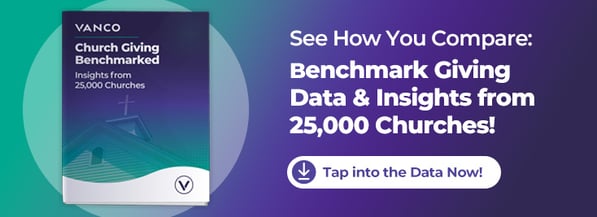
Traditional forms of giving to churches, like offering plate donations from individuals, have declined in recent years. This includes both plate donations and tithes. We could blame the lack of tithes on COVID, but this shift was already in motion before 2020. In fact, Church Development reported that only 5% of churchgoers tithed before the pandemic struck the U.S.
This is why ministries must go beyond the expectation for members to tithe. The data on church trends not only suggests that fewer people partake in the practice, but those that do follow it, divide their giving across a variety of causes.
For over 30 years, the share of giving going to religious organizations has been dropping in the U.S. So, what are churches looking to maintain their primary sources of income to do amid these headwinds?
These ministries need to rely on many traditional and alternative sources of income for churches.
So, how are churches funded? Diversified sources of income, such as an automatic church system, for churches create more stability. That means you are able to accomplish the things your church has been called to do without worrying about how to fund those ministries. Creating a budget and keeping donors up to date on how their contributions are being used through church financial reports are two methods of accomplishing this goal. Both are activities in which your church finance committee will be heavily involved as those entrusted to help manage your financial picture and activities.
Giving and tithes will always be inconsistent for churches. It is the nature of any nonprofit. It is simply too hard to predict the ebb and flow of individual donations, but with several alternative sources of income, you can create more predictability and security in your budget.
- Importance of Diverse Sources
- The Role of Financial Stability in Supporting Ministry and Outreach
- Giving
- Fundraising
- Leveraging Existing Resources
- Build Longevity for Your Church with a Free, Comprehensive Stewardship Guide
Importance of Diverse Sources
Having a diverse stream of income sources is so important for the financial health and sustainability of a church. A single source of income, such as tithes and offerings, can be inconsistent and unpredictable, meaning financial instability.
Diversifying revenue streams, such as implementing fundraising ideas for churches, renting out church spaces or exploring online giving, can provide a steady flow of income. This approach not only safeguards the church from potential financial difficulties, but also allows for the expansion of ministries and the potential to reach a wider community.
The Role of Financial Stability in Supporting Ministry and Outreach
Financial stability plays a pivotal role in supporting the ministry and outreach efforts of a church. It ensures the availability of needed resources, facilitating the church's mission to spread the gospel, serve the community and provide a nurturing spiritual environment.
A stable base of financial contributions allow the church to focus more on their core functions and less on fundraising. It enables the continuous operation of existing ministries, support for mission work, assistance for the needy and the capacity to respond effectively to unforeseen events or opportunities. A financially stable church is better equipped to fulfill its mission, expand its reach and make a significant impact in the lives of its members and the community at large.
Top Sources on How Churches Make Money: Giving
“Know well the condition of your flocks, and give attention to your herds” (Proverbs 27:23).
By mid-summer 2020, polling showed that most non-profits, including religious organizations, expected giving to decline in the rest of the year. That did not happen. In fact, not only did 2020 charitable donations increase by 7.6 percent over the previous year, but non-profits saw a boost in the number of donors that gave.
The simple lesson from that is, when there is a need, people respond. That is especially true for your church members who have a hand in making sure that your ministries succeed.
Ways for churches to get money is important, not just for specific ministries but for keeping the lights on. Without it, there are no services, no place to gather, and essentially no church.
Jesus taught us that we should give wholeheartedly (Mark 12:41-44) but also that we should be responsible with the gifts we have (Matthew 25:14 - 30). In every giving initiative you start, be sure to emphasize that donors are central to the mission of the church. Through them, the work of the church––the work of God––is made possible.
Plate Offering
With some exceptions, most churches can include a ballpark of tithes and offerings in their annual budget. You may already track plate giving, so you can make an estimate on what members gave in past years.
What changed in 2020 is that in-person services ceased. For many church members, this was unfortunate, since traditional ways of giving are important. It is a tangible connection to the church and could even have some ritualistic meaning to them.
But this was an opportune time to ensure members know that you affirm their participation while providing alternative ways of doing plate offering. Many churches have set up specific weekly online campaigns that take the place of traditional weekly in-person giving.
And thanks to user-friendly online platforms, churches have been successful in doing so. You can even include links to campaigns during online services. You can keep the ritual by supplementing the actual plate offering with virtual giving.
However your plate offering evolves, it is important to create a warm atmosphere that encourages giving. That's why we built church offering videos to help you inspire giving. These videos can be streamed from any location, making them suitable for in-person and online worship.
If you're looking for more online videos to use during church services, such as welcomes and countdowns, we have you covered. Vanco's YouTube channel also has instructional guides to help your church. Subscribe to gain access to all the materials.
Tithing
If your church teaches tithing or giving a certain percentage of your streams of income to God (Genesis 28:22), then that is a theological outlook. We are not here to tell you how to interpret Scripture, but rather to offer insights into how to make the most of the gifts your church has.
Regardless of what your church believes theologically about giving––why or how much people should give––church members usually embrace some structure. Said another way, most families budget for charitable giving based on their income.
Knowing this can help you plan. The important thing is that your church members realize how important it is. Since tithing is more “automatic” than other forms of giving, like fundraising for specific causes, it can be less exciting and seem less meaningful.
Even if your congregation does not embrace the concept of “tithing,” communicate to your members how much regular giving means to the church. Make sure they know how impactful it is and that, without it, many church activities would not be possible.
Pledge Drives
Tithing goes hand-in-hand with commitments to give and these proven ways to give to church. Annual pledge drives should be an important component of determining your church budget for the coming year. Holding them at the end of a calendar year will allow you to see in writing what people intend to give during the coming one.
Beyond budgeting, there are two other reasons that pledge drives are effective. One is that members usually pledge at least what they gave last year. But often they increase their pledge.
The other is that it creates a sense of responsibility. There is no reason to think that pledges are shaky sources of income for churches until fulfilled. Members tend to donate throughout the year what they committed to giving.
Of course, people have things come up. But in general, you can plan to receive approximately whatever your congregation pledged during the drive.
In short, pledge drives are dependable and encourage giving. And tools like online giving forums create greater reliability because they make it easier for members to fulfill their obligations.
You will find that monthly givers will set up automatic payments. And most people are more apt to go online and complete a form than they are to write and mail a check.
Themed Giving
Organize giving around holidays or special fundraising events during the year. For instance, many Baptists take part in the Lottie Moon Christmas Offering and the Annie Armstrong Easter Offering.
It does not take much effort to brand a campaign with a holiday or seasonal theme. And there are a lot of people who may be more willing to contribute to an “Easter Offering” than they are to one with more general branding.
But it does not have to be about holidays. At the conclusion of a school year, you can encourage members to fund improvements for the church playground or gymnasium, in honor of graduating seniors.
You can base these on theological themes as well, such as charity, tithing or stewardship. Or conduct them around more pragmatic teachings, like helping those in poverty or evangelism outreach.
If your church follows the liturgical calendar, you can base giving around scripture during those days or times of the year. For instance, encourage members to offset the money they save during Lent with a contribution to a ministry that helps those who go without.
Even if your church does not follow the liturgical calendar, you probably have classes and discussions around such topics. If you are planning a seminar on biblical messages on financial peace, for example, it is a perfect time to couple that with a giving campaign.
Such initiatives are an opportunity to reach existing members, who may or may not be regular givers. But they also are a chance to cast a wider net to people in the community.
You might connect with those––members or non-members––who only attend church during certain times of the year, like Christmas or Easter. So, this approach can be a valuable outreach tool, as well as a financial one.
Sponsorships
You can ask for sponsorship for any number of activities or products associated with your church. Many congregations allow specific contributions to communion flowers or special pieces of furniture, like pews, purchased for the sanctuary.
Many churches sponsor missionary families or campaigns to help a child living in an impoverished part of the world. You might be called to raise money to fund a scholarship for a teenager to attend a camp for underprivileged youth.
These may not be big alternative revenue sources for churches. But they provide value or offset costs that the church would otherwise incur. And many people appreciate the connection to a particular cause or donation.
Memorials
When people pass away, they often want the monetary assets that they leave behind to continue supporting the causes they promoted in life. Especially for devoted members, the church may be their top charitable priority.
The reason this is a “source of church income” topic is that less than half of all Americans have a will. This means that, in the event of their death, their resources will go to the next of kin or be dispersed by the courts.
This is a topic that is appropriate to breach with your congregation, albeit in the appropriate manner and forum. It is something you can talk about in the context of ensuring that the resources they accumulated in life are put to their intended uses when they are gone.
This is not so much a budgeting aspect of church planning but something to think about for long term sustainability. And, if the church means enough to someone to have it put in their will, you can assume that the amount will be substantial.
Alternative Sources on How Churches Make Money: Fundraising
“For which of you, intending to build a tower, does not first sit down and estimate the cost, to see whether he has enough to complete it?” (Luke 14:28).
Doing giving outreach is an ongoing process if you want your church to be financially stable. But church fundraising can be a huge supplement to these efforts.
Taking on new projects or ministries may require church funding that is far beyond their budget. Being called to something evokes enthusiasm and motivation. But successful ministries also need planning and budgeting.
Whether fundraising is for regular, annual events or for a one-time initiative, it is a key part of church income. It can take many forms and will be unique to your congregation's goals and existing resources.
Targeted Ministry Campaigns
“Ask and it will be given to you” (Matthew 7:7).
Well, within reason.
You might think it is too much to ask your congregation to fund specific needs when they already give so much. That is a legitimate concern and asking for too much too often can be off-putting.
But if you have a legitimate cause that you would like to fund, then you must be honest about how much it will cost to get you there. And if your congregation has already agreed that this endeavor is part of its mission, then they will support whatever it takes to ensure success.
Also, for a lot of people, contributing to a specific ministry can be motivating. They like feeling they are part of an important cause. And they can see their contribution at work, whether it is for church-supported missionaries or paying for a meal served at a homeless shelter.
If you feel uncomfortable lobbying for special projects from the pulpit, do it through committees, newsletters, and social media.
Capital Campaigns
The difference between a targeted giving or fundraising campaign, church crowdfunding campaign and a capital campaign, is a subtle one. But, for the purposes of determining diverse streams of income sources, it is worth making the distinction.
Church fundraiser ideas can be for almost any particular cause, big or small. They can be to raise money for a youth mission trip or for replacing an HVAC system that abruptly failed.
But capital campaigns take the form of beefing up overall resources for the many missions of the Church Buildings. They are to make sure these endeavors continue uninterrupted. You can think of capital campaigns as ensuring the church does more or better at the ministries it’s already carrying out.
Capital campaigns can pay for that mission trip or broken HVAC system. But they are done in anticipation of future needs, not in response to current ones.
This does not mean that they are only for “the unexpected.” You may not know exactly when the AC will go out, but you know at some indeterminate time in the future it will. The point is that you have the money available for the project when you need it.
To have a successful campaign, you and church leadership must decide what success looks like. Determine what may need improving in the years ahead and set a corresponding goal for the campaign.
Churches usually hold these every few years, but there is no set rule. Some churches have stand-alone committees that plan them. But your finance committee may be suitable for taking up the task.
Events
Events are a great way to generate church revenue and for attendees to have a good time. These can be anything from festivals to themed religious events. It could be as simple as a barbecue or seafood boil that parishioners help put on themselves.
Hold a ticketed dinner or a church-wide cookoff. Charge admission for guests and fees for those who wish to compete. You could even use some of the proceeds to fund a prize for the winners.
Leverage the talent in your church and have a special concert series. But consider looking outside your church for talent as well.
Local musicians or college quartets may be willing to perform classical pieces for which you could charge admission. These events have the potential to attract larger audiences beyond your congregation.
You could hold events to fundraise for a specific ministry or cause. They can be a one-time thing or recurring.
Regular events have the potential to grow in popularity and become more successful over time. An annual oyster roast, for instance, may become a popular attraction in the community. And, for that reason, it could be a reliable source of income for your church each year.
Besides admission into the event itself, think about smaller ways to raise money for churches during them. Have raffles or silent auctions for donated items.
Think outside the box. If you have any musicians or music teachers in your congregation, ask them to donate lessons as an item for sale or raffle.
Services
Most churches have plenty of classroom space for Sunday school and Bible studies. You can use these rooms to provide any number of services, including childcare or counseling services.
Services also can be as simple as having a regular “parents night out.” Childcare is expensive, and parents may be more willing to support the church than they are to call up their babysitter.
Products
There are many different products your church can sell. Starting a small book store, for instance, can be a lucrative endeavor, and not just for megachurches.
The congregational revenue of religious publishers increased almost 15 percent in 2019, reaching $1.22 billion. And more than three-quarters of that came from printed materials.
The success of a church bookstore will depend on the size of your congregation. In short, you want sales to exceed the cost of operations. If your church only has 100 people in attendance each Sunday, you may not have enough regular customers to make it worth your while.
You also will need a location for the store that attracts people passing by. Near one of the main entrances or exits for regular services is ideal. If the only available spot is in the basement, where people must seek it out, then it may not be a good call.
Some churches have found coffee shops to be a great revenue source as well. Like the bookstore, its potential depends on the size of your congregation and their willingness to pay for the product.
And you do not have to set up a store to sell products. Have members donate baked goods or artwork. It is another way to sell items that people want and can use anyway while benefiting the church financially.
These enterprises have the added benefit of encouraging people to spend time at your church. And you can always start out small and see how things go.
Beyond the products themselves, you do not have to buy a lot of extra things to get going. All you need is a cash box and a way to input credit cards such as a portable card reader.
Grants
Grant funding is a great resource for many no-profits, including religious ones. First, your church must be registered as a 501(c)(3) non-profit organization with the IRS.
There are various steps you will need to take to do this, like establishing a board of directors. But you cannot receive grant money from private foundations or government entities without having this classification.
Most government grants, which are public funds, have restrictions on supporting religious activities. Although there are some faith-based federal and state grants. You can search for federal grants at www.grants.gov.
But private foundations can give to whatever causes they deem worthy of assistance. A good place to start is establishing a relationship with a local foundation.
There are online tools to help you search for grants from all sources, including foundations. These allow you to sort results by issue area, funding source, amount, and many other criteria.
Many of these portals charge membership fees. But, if you are serious about finding funding for a project or service your church wants to provide, it may be worth it.
Also, consider enlisting the help of someone with grant proposal writing experience. Or find someone in your congregation with these skills. If they work at a non-profit or have technical writing experience, get their assistance.
Alternative Sources on How Churches Make Money: Leveraging Resources
“And the [servant] with the two talents also came forward, saying, ‘Master, you handed over to me two talents; see, I have made two more talents.’ His master said to him, ‘Well done, good and trustworthy servant...I will put you in charge of many things’.” (Matthew 25:22-23)
Besides focusing on money coming in from individuals or through events, look at assets your church already has. Leveraging existing resources for financial gain is smart and responsible. And it is a great way to add another income stream to your budget.
Investment Capital
Like in your personal life, make sure your church’s savings are getting the most return that they can. When you are dealing with the money of church members (as opposed to your own money), this takes on a different approach.
You want to be a good steward of the money your members have so selflessly given. And this means understanding their level of risk. Investing in stocks, for instance, may be out of the question.
But, even if you are not in a position to invest large amounts, at least make sure you are using an interest-bearing checking account. If you are not tied to a particular bank, look around for the best savings or CD rates. And always have enough cash on hand for your budget needs and emergency situations.
Beyond that, decide with your members what is the best use for reserves. If you do not have a finance committee, consider establishing one.
Another good practice is to have different accounts for distinct goals. For instance, your church may be planning building improvements within five years. If you are confident you will not need the funds until that time, then committing to a longer-term CD may be a financially savvy move.
All states have specific rules that govern how non-profit organizations invest their money. They are usually very general and have to do with the level of risk. Know the tax law constraints and ensure your church is operating within them.
And the simplest way to discern how to invest your church’s savings is to consult a financial advisor. Although most returns on investment for non-profits are not taxable, an advisor will be able to help you get the most out of your investment and ensure you are in compliance with all laws.
Renting
Federal law requires that tax exempt entities use their facilities exclusively for appropriate purposes. This is to prohibit organizations from saying that they a church to gain tax-exempt status, then running a business on the premises.
You may already allow meetings for recovery groups or social clubs, that may not be exclusively for members. And that is all within the constraints of the law.
But you may not know that you can charge for the use of your facilities, as long as it involves other non-profit organizations or is within “the mission of the church.” For instance, if your music minister wants to give lessons in one of your classrooms, then it is appropriate for him or her to pay the church for the usage.
Local orchestras may have an interest in putting on concerts in your sanctuary. You could even rent out your gym facilities to different sports teams or other recreational groups.
But it does not have to be an employee of your church. Small non-profits that operate from home or otherwise without business space may need the occasional use of conference rooms or small offices.
Note that income of this type could be subject to taxation. Be sure to check with your church’s accountant to get answers to any questions you have about renting space. It could be a good alternate, additional source of revenue, as long as it does not impact your tax-exempt status.
In-Kind Donations
While finding different sources of revenue for your church is important, another way to come at it is to find ways to offset costs. Look to your congregation for their skills and expertise in services that you would otherwise have to pay for.
If you have a CPA in your congregation, they may be willing to help out with accounting, even if you still go outside for annual tax filings. Some churches have volunteer receptionists or file clerks, especially if the hours are minimal. You can even rotate these positions among members so that no one gets burned out.
A simple groundskeeping chores around your church campus is a collaborative and engaging men's ministry idea. Almost anyone can clean gutters, pressure wash sidewalks, clear debris, or trim hedge bushes.
There may be certain rooms in your church that you would want to have professionally painted. But for others, a paint job by member volunteers may suffice.
Any one of these menial tasks may be inexpensive. But cumulatively the money you save over the course of years can make an impact. It is also a way to make use of the gifts your church has been given, in the form of knowledge or service.
Get the Free eBook to Improve Church Stewardship
Keeping the lights on, the doors open and missions funded isn't what inspired most church leaders to pick their career, but it is key to the health of the church and the congregation. Discover how to become a master of church stewardship with our ultimate guide.














